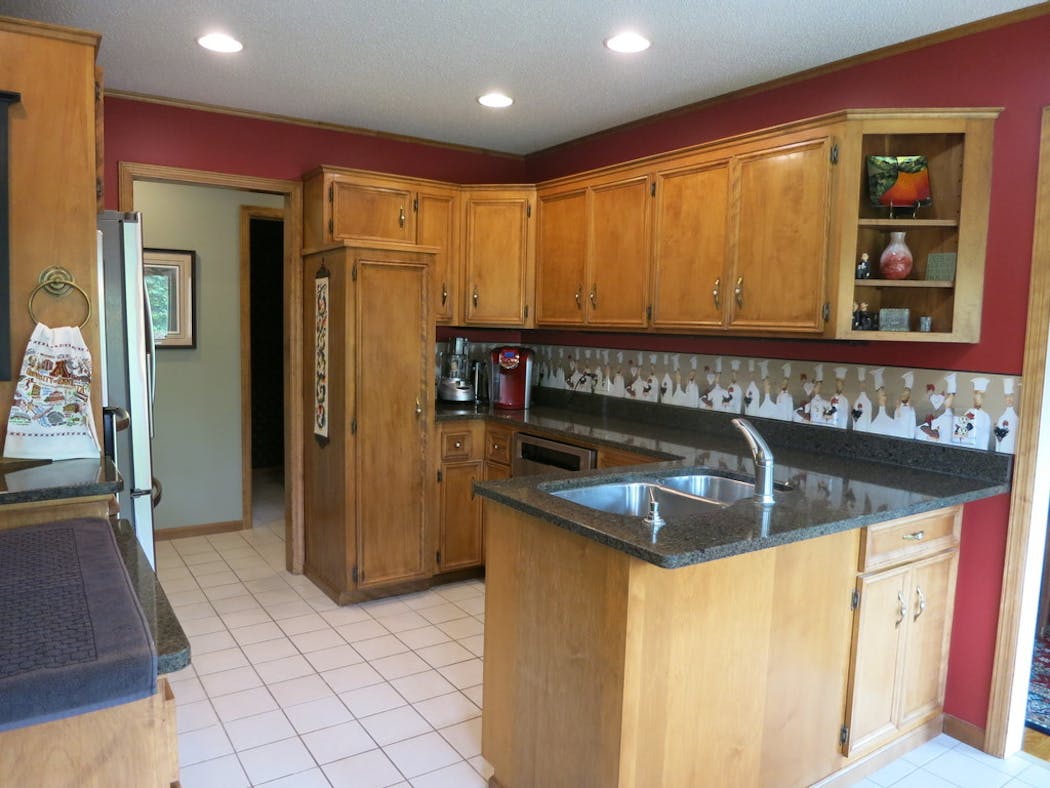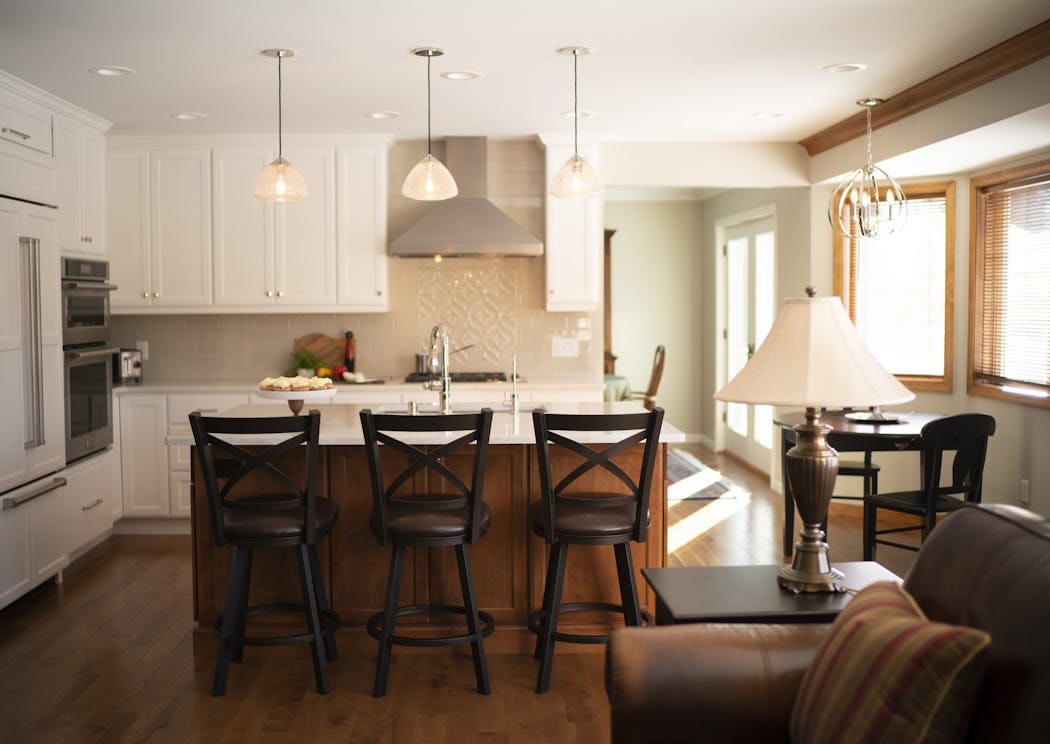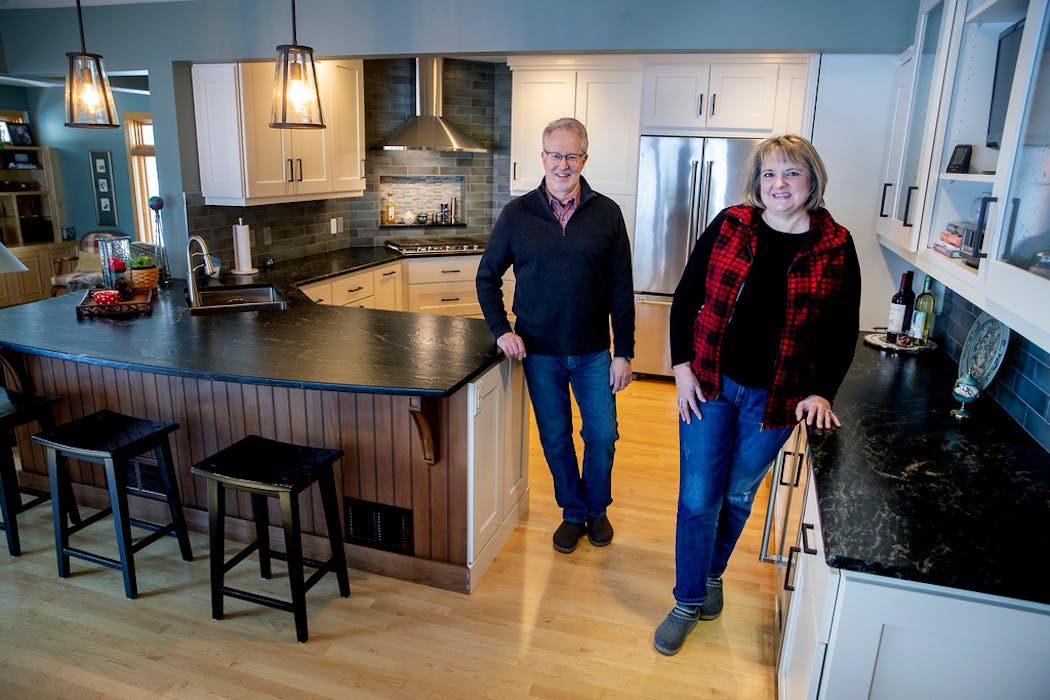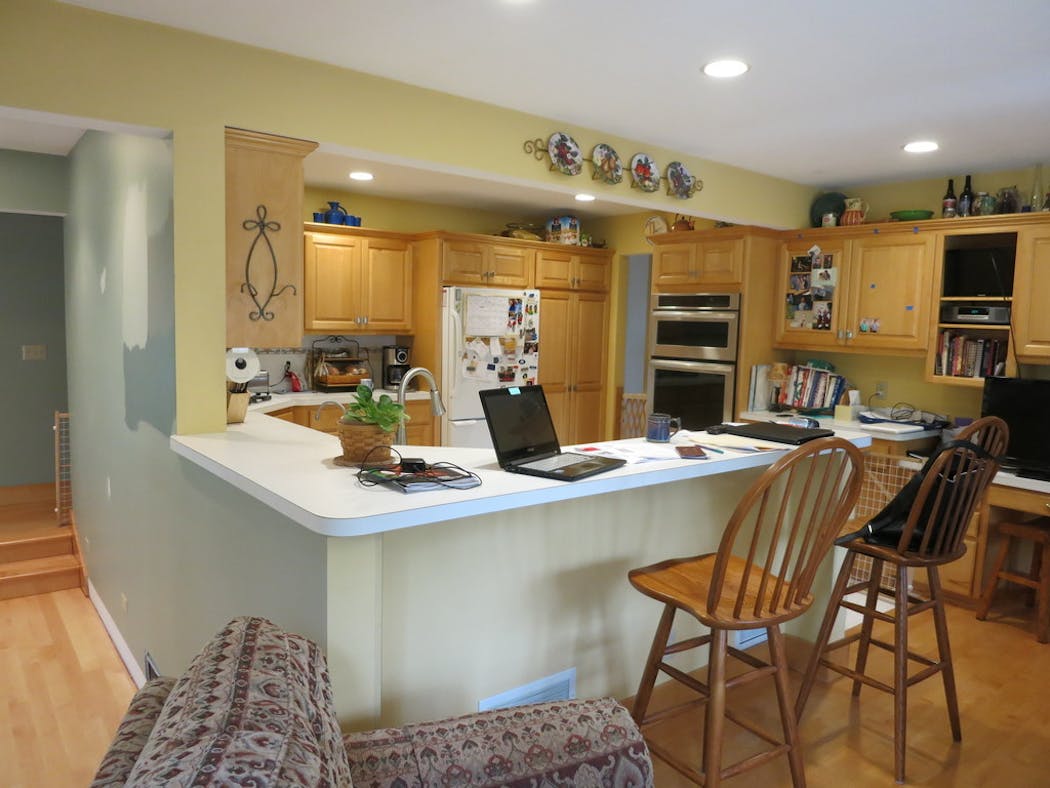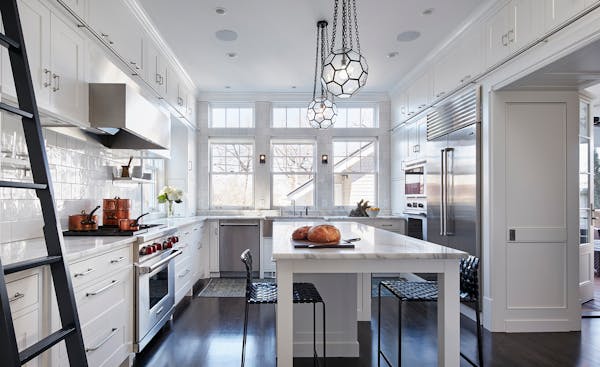After more than 30 years in their Plymouth home, John and Arlys Edson were thinking about a change.
They were tired of their closed-off, dated kitchen, especially as John, an amateur chef, looks forward to spending time cooking after he joins his wife in retirement. They wondered if it was time to downsize to a smaller home with the open layout they desired.
They began looking at a variety of townhouses. But nothing they visited — not even places that were newly built — felt right.
"We love our neighborhood. We have great neighbors, walking paths right out our door. We have a park, we back up to a lake. We were kind of spoiled," said Arlys, a retired teacher and corporate trainer. "We just never could duplicate our location."
The Edsons, who are in their 60s, decided to stay put in their four-bedroom home, which was built in 1986 — and remodel the kitchen instead.
"Really, when we looked at the cost difference between doing this in our existing home, which has the wonderful location, versus buying a new townhome somewhere else in more of a high-density neighborhood, we decided we wanted to do the remodeling," Arlys said. "From a financial perspective, we feel that this was a really good decision for us."
And now that the project is complete, they couldn't be happier. "We just walk around, and we're like, 'Oh, my gosh, how could this be? We should have done this 20 years ago,' " she said.
The Edsons' remodel, which involved taking out walls and opening up their kitchen to their living room, was finished last month — and downsizing is off the table, for now.
A growing number of Americans are making similar decisions as they approach retirement.
Many couples once aspired to first own a home, then have kids and move to a larger one, only to later downsize into a more modest house and put any potential earnings left from the sale of the bigger home into their retirement savings. But baby boomers today are working until later in life, and often are welcoming their adult children back to the family home for extended periods. A shortage of less-expensive, smaller homes across the country, including in the Twin Cities area, also makes downsizing less appealing.
Instead, many empty nesters are looking to remodel their current homes, according to a national 2019 Chase Bank survey of more than 700 baby-boomer homeowners. More than half of the respondents said they did not ever plan to move from their family home, while 88% said they plan to renovate.
Downsizing delayed
Downsizing is still happening, but later, studies suggest. An analysis of census data by online real estate company Trulia found that in 2016, the age where it became more common for senior households to downsize into a multifamily home vs. moving to a single-family home was 80. In 2005, that tipping point was happening by age 75, according to the analysis.
For the Edsons, who have an adult daughter and enjoy hosting relatives, their current home's biggest draw was its location, and the fact that it offers extra space to be able to welcome family. The nearby walking path also allows for easy, accessible exercise.
"We're very active and doing lots of things. I just don't want to end up with a sedentary lifestyle," Edson said. "You know, 60 is the new 40."
Mary Maney, an interior designer and certified kitchen designer with Crystal Kitchen + Bath, said that she works with many baby-boomer homeowners who have decided to stay put and make improvements.
"The majority of our clients are 60 and older, and we do basically 99% remodels," said Maney, who designed the Edsons' kitchen project.
A typical client is someone whose kids have been gone for quite a while, who has looked around at moving options and decided to stay. "Basically they come back to, 'I like my neighborhood, I like my house. I don't want to take on homeowners association fees. I'll just stay where I'm at, and live here for as long as I can,' " she said.
For her company, the average kitchen remodel starts at $75,000, including cabinets, countertops, lighting, plumbing, "the whole gamut," Maney said.
"Lighting is important," she said. "It's funny how poor lighting is in most homes that we remodel. You've got a single fixture and one over the sink, and that's it. As you age, you definitely need more of that."
Most of her clients aren't making changes with an eye to selling, but are thinking about their own future in the home, she said. "I would say, easily 75% or higher are doing it just for themselves."
'We love where we are'
After their youngest left for college, Sue and Mark Read considered downsizing from the Deephaven home they had built 27 years ago.
Sue had an idea of what the next stage of life might look like, and at first, it didn't necessarily involve remodeling her current kitchen.
"I think you kind of romanticize changes at this point in our life, where you're close to retirement, and you think, 'Oh, wouldn't it be great to live in a neat little house down by the lake, and we can walk to get coffee,' " she said. "We thought, 'Let's move into Excelsior. Let's move downtown. It will be great.' "
But as they considered a move and checked prices, they worried about bringing mortgage debt from a new house into retirement. They realized that they actually loved their current location, on 1¼ acre of land, yet near the city, in a neighborhood they enjoy.
"We love where we are. It's a great neighborhood. You know, we've got a mixture. We have old people, and middle-aged people, and we've got a neighborhood baby now. We're happy about that," Sue said.
Sue, who moved around a lot as a child, also realized that she wasn't ready to uproot from the place where so many family memories had been made.
"My parents moved for one of the last times when I was in college. I hated the fact that I never had a place to come home to. And I didn't want to do that to my kids," she said. "It was important to me that we didn't pull up their home, even while they're still in college. They don't live at home, but they don't own their own homes."
The Reads decided to stay, but make a few changes. Their plan started with simply changing the knobs on their cabinets — but in the end they hired Maney to remodel the entire kitchen, replacing flooring, cabinets, countertops and appliances.
"We made the decision that we would put money now into doing the things to make our home more aesthetically pleasing for us," Read said. "Everybody asked us, 'Are you doing this for resale or for yourselves?' Well, for ourselves."

The 5 best things our food writers ate this week

A Minnesota field guide to snow shovels: Which one's best?

Summer Camp Guide: Find your best ones here

Lowertown St. Paul losing another restaurant as Dark Horse announces closing

